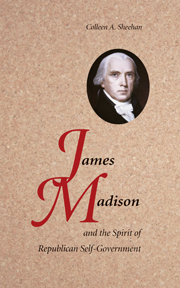Book contents
- Frontmatter
- Contents
- Acknowledgments
- List of Abbreviations for Sources
- Preface
- Introduction: Madison's Legacy
- 1 Republican Opposition
- 2 The Federalist Agenda
- 3 Madison and the French Enlightenment
- 4 The Commerce of Ideas
- 5 The Politics of Public Opinion
- 6 Madison and Jefferson: An Appeal to the People
- 7 The Spirit of Republican Government
- Epilogue: The Philosopher's Stone and the Poet's Reprise
- Bibliography
- Index
- References
4 - The Commerce of Ideas
Published online by Cambridge University Press: 05 June 2012
- Frontmatter
- Contents
- Acknowledgments
- List of Abbreviations for Sources
- Preface
- Introduction: Madison's Legacy
- 1 Republican Opposition
- 2 The Federalist Agenda
- 3 Madison and the French Enlightenment
- 4 The Commerce of Ideas
- 5 The Politics of Public Opinion
- 6 Madison and Jefferson: An Appeal to the People
- 7 The Spirit of Republican Government
- Epilogue: The Philosopher's Stone and the Poet's Reprise
- Bibliography
- Index
- References
Summary
In the first term of the Washington administration James Madison had very little time he could call his own. Since he was approaching forty and still a bachelor, this might have been a time devoted to personal considerations and establishing a basis for future domestic happiness. Instead, during this stage of life Madison dedicated himself fully to public affairs and to shaping the future of the new nation. In speeches on the floor of Congress, in public writings, and in private studies, he worked to change the direction in which the Federalists were leading the country. His personal sacrifice was consciously made. He believed that the success of the Federalist program would mean the subversion of republican government in America.
Madison's goal was not merely to resist Federalist views and policy. He also sought to promote a positive alternative to the opposition's philosophy of government, one that, in his view, accorded with the true principles of republicanism. In 1791 he took the lead in promoting the republican cause and providing a philosophic defense of republican principles and policies. Rather than encouraging schemes that mimicked the antirepublican British system of balanced government, increased the power of the national executive at the expense of the local organs of self-government, and diminished the role of the citizenry in shaping public decisions, Madison sought to meet the age-old problem of placing power and right on the same side and to vindicate the idea of republican self-rule.
- Type
- Chapter
- Information
- James Madison and the Spirit of Republican Self-Government , pp. 84 - 106Publisher: Cambridge University PressPrint publication year: 2009



